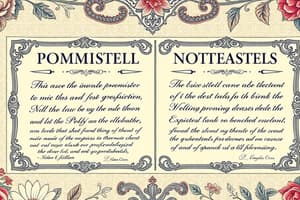Podcast
Questions and Answers
Which of the following is another term for Negotiable Instruments?
Which of the following is another term for Negotiable Instruments?
- Personal Checks
- IOU
- Commercial Paper (correct)
- Verbal Promise
Which of the following is considered the most preferable form of payment?
Which of the following is considered the most preferable form of payment?
- Verbal Promise
- Negotiable Instrument
- IOU
- Cash (correct)
Who is the 'Drawer' of a draft?
Who is the 'Drawer' of a draft?
- The payee
- The debtor
- The bank customer writing the check (correct)
- The bank
Who is the 'Maker' of a note?
Who is the 'Maker' of a note?
Which of the following phrases must be included in a Negotiable Instrument?
Which of the following phrases must be included in a Negotiable Instrument?
Which of the following is a requirement for becoming a Holder in Due Course (HIDC)?
Which of the following is a requirement for becoming a Holder in Due Course (HIDC)?
If a negotiable instrument does not specify a payment date, when is it payable?
If a negotiable instrument does not specify a payment date, when is it payable?
Which of the following must be included in a negotiable instrument?
Which of the following must be included in a negotiable instrument?
What is the effect of a party NOT being a Holder in Due Course (HIDC) on their ability to enforce a note?
What is the effect of a party NOT being a Holder in Due Course (HIDC) on their ability to enforce a note?
Which of the following does NOT destroy the negotiability of an otherwise negotiable instrument?
Which of the following does NOT destroy the negotiability of an otherwise negotiable instrument?
In a draft, who is the drawee?
In a draft, who is the drawee?
In the context of negotiable instruments, 'good faith' primarily refers to:
In the context of negotiable instruments, 'good faith' primarily refers to:
Which party in a draft is also known as the 'payer'?
Which party in a draft is also known as the 'payer'?
What type of defense is 'Fraud in the Inducement'?
What type of defense is 'Fraud in the Inducement'?
Which of the following is required to achieve the status of Holder in Due Course (HIDC)?
Which of the following is required to achieve the status of Holder in Due Course (HIDC)?
What does 'no knowledge' refer to in the context of becoming a Holder in Due Course?
What does 'no knowledge' refer to in the context of becoming a Holder in Due Course?
In a two-party note, what is the role of the maker?
In a two-party note, what is the role of the maker?
When can a subsequent holder of a Negotiable Instrument (NI) have greater rights than their predecessor?
When can a subsequent holder of a Negotiable Instrument (NI) have greater rights than their predecessor?
If there are multiple makers on a note, what is the extent of their liability?
If there are multiple makers on a note, what is the extent of their liability?
What is the primary remedy for homeowners who were fraudulently induced into signing notes with unfavorable terms, when the notes are held by a Holder in Due Course?
What is the primary remedy for homeowners who were fraudulently induced into signing notes with unfavorable terms, when the notes are held by a Holder in Due Course?
Which of the following is a typical example of a note?
Which of the following is a typical example of a note?
Why might a business prefer to issue a negotiable instrument like a check instead of an IOU?
Why might a business prefer to issue a negotiable instrument like a check instead of an IOU?
What is a key requirement for a third party to achieve Holder in Due Course (HIDC) status?
What is a key requirement for a third party to achieve Holder in Due Course (HIDC) status?
What protection does Holder in Due Course (HIDC) status provide to a third party?
What protection does Holder in Due Course (HIDC) status provide to a third party?
In the scenario with the plumbing company, could the plumbing company (Payee) be a HDIC?
In the scenario with the plumbing company, could the plumbing company (Payee) be a HDIC?
What does writing 'without recourse' on a negotiable instrument indicate?
What does writing 'without recourse' on a negotiable instrument indicate?
Which of the following is an example of a combined endorsement?
Which of the following is an example of a combined endorsement?
According to the content, which of the following is the most liquid?
According to the content, which of the following is the most liquid?
If a negotiable instrument is payable to 'cash' or 'bearer', how is it negotiated?
If a negotiable instrument is payable to 'cash' or 'bearer', how is it negotiated?
What is the role of endorsements on a negotiable instrument?
What is the role of endorsements on a negotiable instrument?
Which of the following is NOT one of the transfer warranties made by the endorser of a negotiable instrument?
Which of the following is NOT one of the transfer warranties made by the endorser of a negotiable instrument?
According to the content, what elevates the quality of a paper to a NI?
According to the content, what elevates the quality of a paper to a NI?
What is the effect of an acceleration clause on the negotiability of an instrument?
What is the effect of an acceleration clause on the negotiability of an instrument?
Which of the following is a personal defense against payment of a negotiable instrument?
Which of the following is a personal defense against payment of a negotiable instrument?
A Holder in Due Course (HIDC) is NOT subject to which type of defense?
A Holder in Due Course (HIDC) is NOT subject to which type of defense?
Which party is generally liable for forgeries on the front of a negotiable instrument?
Which party is generally liable for forgeries on the front of a negotiable instrument?
Which of the following is an example of a real defense?
Which of the following is an example of a real defense?
What is the consequence if you fail to notify your bank of a forgery in your account within 30 days?
What is the consequence if you fail to notify your bank of a forgery in your account within 30 days?
Which of the following endorsements requires the bank to deposit funds into the payee's account?
Which of the following endorsements requires the bank to deposit funds into the payee's account?
What type of endorsement occurs when the payee simply signs their name on the back of the negotiable instrument?
What type of endorsement occurs when the payee simply signs their name on the back of the negotiable instrument?
Which defense involves a party being tricked into signing a negotiable instrument, believing it to be something else?
Which defense involves a party being tricked into signing a negotiable instrument, believing it to be something else?
Which of the following is considered the ultimate form of payment, carrying the least risk?
Which of the following is considered the ultimate form of payment, carrying the least risk?
Which of the following results in the instrument being worthless, due to a court order?
Which of the following results in the instrument being worthless, due to a court order?
Which scenario exemplifies 'Fraud in the Inducement'?
Which scenario exemplifies 'Fraud in the Inducement'?
When a party pays a negotiable instrument more than once, it is known as what?
When a party pays a negotiable instrument more than once, it is known as what?
Flashcards
Draft
Draft
A three-party instrument where one party (drawer) instructs another (drawee) to pay a third party (payee).
Drawer
Drawer
The party who signs and orders the payment in a draft.
Drawee
Drawee
The bank or entity instructed to make the payment from the drawer's account.
Payee
Payee
Signup and view all the flashcards
Note
Note
Signup and view all the flashcards
Maker
Maker
Signup and view all the flashcards
Payee
Payee
Signup and view all the flashcards
Negotiable Instrument (NI)
Negotiable Instrument (NI)
Signup and view all the flashcards
Holder In Due Course (HIDC)
Holder In Due Course (HIDC)
Signup and view all the flashcards
Qualified Endorsement
Qualified Endorsement
Signup and view all the flashcards
Combo Endorsement
Combo Endorsement
Signup and view all the flashcards
Transfer Warranties
Transfer Warranties
Signup and view all the flashcards
No Forgeries (Warranty)
No Forgeries (Warranty)
Signup and view all the flashcards
No Material Alterations
No Material Alterations
Signup and view all the flashcards
No Insolvency (at this time)
No Insolvency (at this time)
Signup and view all the flashcards
No Claims or Defenses
No Claims or Defenses
Signup and view all the flashcards
Personal (Limited) Defenses
Personal (Limited) Defenses
Signup and view all the flashcards
Universal (Real) Defenses
Universal (Real) Defenses
Signup and view all the flashcards
NI fatal flaws
NI fatal flaws
Signup and view all the flashcards
Good Faith
Good Faith
Signup and view all the flashcards
No Knowledge
No Knowledge
Signup and view all the flashcards
Personal Defenses
Personal Defenses
Signup and view all the flashcards
Fraud in the Inducement
Fraud in the Inducement
Signup and view all the flashcards
HIDC Benefits
HIDC Benefits
Signup and view all the flashcards
Real Defenses
Real Defenses
Signup and view all the flashcards
Breach of Contract
Breach of Contract
Signup and view all the flashcards
Failed Consideration
Failed Consideration
Signup and view all the flashcards
Wrongful Completion
Wrongful Completion
Signup and view all the flashcards
Duplicate Payment
Duplicate Payment
Signup and view all the flashcards
Bankruptcy
Bankruptcy
Signup and view all the flashcards
Forgery
Forgery
Signup and view all the flashcards
Draft (e.g., Check)
Draft (e.g., Check)
Signup and view all the flashcards
Note (e.g., Note Payable)
Note (e.g., Note Payable)
Signup and view all the flashcards
NI Requirements (5)
NI Requirements (5)
Signup and view all the flashcards
HIDC Criteria (4)
HIDC Criteria (4)
Signup and view all the flashcards
Study Notes
- Negotiable instruments are also known as "Commercial Paper."
- Cash is the most preferable form of payment.
- Negotiable instruments enhance enforceability compared to verbal promises or simple written agreements.
- To ensure full payment, demand cash only.
Categories of Negotiable Instruments
- Holder In Due Course (HIDC): Has higher value and legal standing.
- Not HIDC.
Types of Negotiable Instruments
- Draft (e.g., check).
- Note (e.g., Note Payable).
Draft
- Drawn on a "Drawee" (typically a bank).
- Signed by the "Drawer" (the bank customer who writes the check).
- Paid to the order of a "Payee" (the person or entity the Drawer intends to pay).
Note
- Paid to the order of a "Payee" (the person or entity to whom money is owed).
- Signed by the debtor or "Maker" (the person who owes the money).
Criteria for Negotiable Instruments
- Unconditional promise to pay "to Order" or "to Bearer".
- Payable on Demand or at a specific time/time interval.
- Sum Certain (legally recognized tender, like USD).
- In Writing.
- Signed by the Drawer (for a Draft) or the Maker (for a Note).
Payable on Demand
- Payable on demand if no specific time or time interval outlined.
- Examples: Check, Draft, Money Order, Cashier's Check.
Time Interval
- Payable over a time interval.
- Examples: House Note, Car Note (typically paid to a bank or financial institution in installments).
Sum Certain
- Often in USD, but can be in any denomination/currency recognized.
Doesn't Destroy NI
- The following terms do not destroy negotiability:
- Interest rate.
- Collateral.
- Acceleration clauses.
- Attorney fees.
Draft Example
- Jane Adams, President (Drawer) of OurTown Real Estate, signs a draft.
- First National Bank (Drawee) is instructed to pay Eastman Supply Company (Payee).
- The Drawee pays the Payee from the Drawer's account when the Payee cashes or deposits the draft.
Note Example
- Lawrence E. Roberts and Margaret P. Roberts (co-makers/Debtors) sign a note.
- First National Bank (Payee/Creditor) receives payment.
- Each co-maker is 100% liable for the debt.
- Common Notes include: House Notes, Student Loans, Car Notes.
Negotiable Instruments - Basics with Illustration
- By using a check (Draft), a customer makes it a negotiable instrument.
- A negotiable instrument allows for third-party transfers.
- If the plumbing service transfers the Draft/check to a good faith third party who paid value and has no knowledge of any problems, the third party becomes a Holder In Due Course (HDIC).
- A Holder In Due Course (HDIC) can enforce the instrument against you (the customer) regardless of the "defect in plumbing services".
Holder in Due Course (HDIC) Criteria
- Holding/Has possession of the negotiable instrument.
- To reach the status of HIDC one must Paid value for the instrument.
- Acting in good faith, and having no knowledge of problems.
Good Faith and No Knowledge
- Good faith: Is there something suspicious/odd? Does the transaction look strange?
- No knowledge: Is the party aware of a breach of contract claim, etc., between the two parties?
Personal Defenses
- Personal Defenses cannot be used against HIDC
- Examples: Breach of Contract, Failed Consideration, Wrongful Completion, Duplicate Payment, Fraud in the Inducement.
Real Defenses
- Real Defenses can be used against HIDC and are effective against all holders.
- Examples: Bankruptcy, Forgery, Judicial Insanity, Material Alteration, Fraud in the Execution.
Negotiable Instruments - Personal and Real Defenses
- If Payee sells the NI to a third or fourth party, these parties could be HIDC, and if they are, all personal defenses "go away"/cannot be used
- There are 5 other defenses that NEVER go away (they're indelible) - these are the Real Defenses
- Personal Defenses cannot be used against HIDC
Orthodontist Example
- Orthodontist provides service, can create a negotiable instrument for payment.
- Selling a negotiable instrument (NI) can raise its quality and selling price.
- If the instrument is not NI, subsequent purchasers are subject to Real AND Personal Defenses.
- If instrument NI, third-party buyers cannot escape Real Defenses, but they can escape Personal Defenses.
Endorsements
- Signing the NI on the back has different implications based on the type of endorsement.
- There are 5 Endorsements.
- Blank: Signing the NI on the back.
- Restrictive: Signing NI + “for deposit only”.
- Special: Writing "pay to (new Payee)" on the back of NI.
- Qualified: Writing "without recourse" or "no warranties" on the NI, which cheapens its quality.
- Combo: Combined Endorsements (more than one Endorsement on a NI).
- If you're really concerned about getting paid, cash is the way to go
- No endorsements required
- Highly liquid
- NI have some constraints that don't make them as liquid as cash
- NI are still pretty liquid
Transfer Warranties
- Endorsements have warranties that "back up the paper"
- The more Endorsements the better
- When a NI is Endorsed, the transferor (the party Endorsing the NI) is making 5 warranties to the recipient
- If the recipient encounters any defenses, they can sue the Endorser on the warranties.
Transfer Warranties
- No forgeries
- The Drawer/Maker is not a forgery (it's an authentic signature)
- All Endorsements before Drawer/Maker were also authentic
- No material alterations
- No insolvency (at this time)
- At the time, the Drawer/Maker is solvent
- No claims or defenses
- Party is entitled to get paid
Summary of Negotiable Instruments
- Verbal promises are not recommended.
- NI are simple but can have complex terms.
- The goal is to make NI as near to cash as possible.
- Want to make them extremely fluid and liquid
- Want to elevate NI to cash equivalents on the balance sheet
Exhibit 28-3 (The Collection Process)
- Forgery on the BACK of the NE, it's the depository institution responsibility to catch
- Forgery on the FRONT of the NE, the bank should be checking
- Drawee bank is liable for forgeries on the FRONT of the NI
- 30 Day Rule: Notify forgery in 30 days, if not you assume responsibility and liability
Exhibit 27-2 (Personal and Real Defenses)
- Universal (Real) Defenses
- Valid against all holders, including HIDC
- Personal (limited) Defenses
- Valid against ordinary holders, but NOT against HIDC
Hypotheticals
- If note is left with blanks, it's not a NI for no Sum Cetain and specific Time Interval.
- Court found that Breach of Contracts is a Personal Defense
- If bank is NOT a THIC, bank is subject to personal defenses.
- If bank meets all four HIDC requirements, the Personal Defense goes away and bank can recover.
Hypothetical #2
- A gave a Draft/Note to B (made it out to B's order - "pay to order of")
- B then donates the Draft/Note to C
- C is a child.
- Is C a HIDC? NO
- Reason, they didn't pay value
- Normally, a successor only gets what their predecessor had, but if C sells the NI -to- D, D now adds the value piece, D now has all 4 criteria and is a HIDC
- Here, the law creates greater rights for the next party in the chain (very rare)
Studying That Suits You
Use AI to generate personalized quizzes and flashcards to suit your learning preferences.




